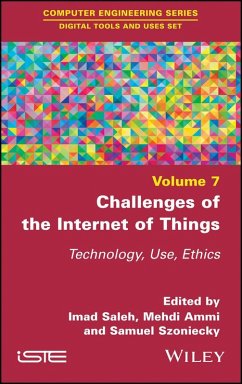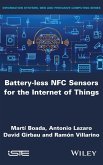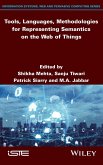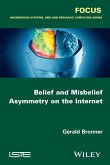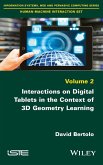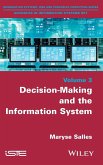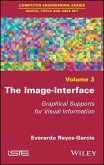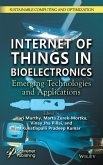I SalehTechnique, Use, Ethics
Challenges of the Internet of Things
Technique, Use, Ethics
Herausgeber: Saleh, Imad; Szoniecky, Samuel; Ammi, Mehdi
I SalehTechnique, Use, Ethics
Challenges of the Internet of Things
Technique, Use, Ethics
Herausgeber: Saleh, Imad; Szoniecky, Samuel; Ammi, Mehdi
- Gebundenes Buch
- Merkliste
- Auf die Merkliste
- Bewerten Bewerten
- Teilen
- Produkt teilen
- Produkterinnerung
- Produkterinnerung
This book will examine the issues of IoT according to three complementary axes: technique, use, ethics. The techniques used to produce artefacts (physical objects, infrastructures), programs (algorithms, software) and data (Big data, linked data, metadata, ontologies) are the subject of many innovations as the field of IoT is rich and stimulating. Along with this technological boom, IoT uses colonize new fields of application in the fields of transport, administration, housing, maintenance, health, sports, well-being. ... Privileged interface with digital ecosystems now at the heart of social…mehr
Andere Kunden interessierten sich auch für
![Battery-Less Nfc Sensors for the Internet of Things Battery-Less Nfc Sensors for the Internet of Things]() Martí BoadaBattery-Less Nfc Sensors for the Internet of Things146,99 €
Martí BoadaBattery-Less Nfc Sensors for the Internet of Things146,99 €![Tools, Languages, Methodologies for Representing Semantics on the Web of Things Tools, Languages, Methodologies for Representing Semantics on the Web of Things]() S MehtaTools, Languages, Methodologies for Representing Semantics on the Web of Things145,99 €
S MehtaTools, Languages, Methodologies for Representing Semantics on the Web of Things145,99 €![Belief and Misbelief Asymmetry on the Internet Belief and Misbelief Asymmetry on the Internet]() Gérald BronnerBelief and Misbelief Asymmetry on the Internet157,99 €
Gérald BronnerBelief and Misbelief Asymmetry on the Internet157,99 €![Interactions on Digital Tablets in the Context of 3D Geometry Learning Interactions on Digital Tablets in the Context of 3D Geometry Learning]() David BertoloInteractions on Digital Tablets in the Context of 3D Geometry Learning158,99 €
David BertoloInteractions on Digital Tablets in the Context of 3D Geometry Learning158,99 €![Decision-Making and the Information System Decision-Making and the Information System]() Maryse SallesDecision-Making and the Information System158,99 €
Maryse SallesDecision-Making and the Information System158,99 €![The Image-Interface The Image-Interface]() Everardo Reyes-GarciaThe Image-Interface158,99 €
Everardo Reyes-GarciaThe Image-Interface158,99 €![Internet of Things in Bioelectronics Internet of Things in Bioelectronics]() MurthyInternet of Things in Bioelectronics171,99 €
MurthyInternet of Things in Bioelectronics171,99 €-
-
-
This book will examine the issues of IoT according to three complementary axes: technique, use, ethics. The techniques used to produce artefacts (physical objects, infrastructures), programs (algorithms, software) and data (Big data, linked data, metadata, ontologies) are the subject of many innovations as the field of IoT is rich and stimulating. Along with this technological boom, IoT uses colonize new fields of application in the fields of transport, administration, housing, maintenance, health, sports, well-being. ... Privileged interface with digital ecosystems now at the heart of social exchanges, the IoT develops a power to act whose consequences both good and bad make it difficult to assess a fair business.
Produktdetails
- Produktdetails
- Verlag: Wiley
- Seitenzahl: 288
- Erscheinungstermin: 21. September 2018
- Englisch
- Abmessung: 236mm x 165mm x 18mm
- Gewicht: 499g
- ISBN-13: 9781786303615
- ISBN-10: 1786303612
- Artikelnr.: 53848552
- Herstellerkennzeichnung
- Libri GmbH
- Europaallee 1
- 36244 Bad Hersfeld
- gpsr@libri.de
- Verlag: Wiley
- Seitenzahl: 288
- Erscheinungstermin: 21. September 2018
- Englisch
- Abmessung: 236mm x 165mm x 18mm
- Gewicht: 499g
- ISBN-13: 9781786303615
- ISBN-10: 1786303612
- Artikelnr.: 53848552
- Herstellerkennzeichnung
- Libri GmbH
- Europaallee 1
- 36244 Bad Hersfeld
- gpsr@libri.de
Imad Saleh is Full Professor in information science and communication, and Director of the Paragraphe laboratory (Paris 8 University and Cergy-Pontoise University, France). Mehdi Ammi is Associate Professor at the University of Paris-Saclay, France, and a researcher at the LIMSI laboratory. Samuel Szoniecky is Associate Professor in digital humanities at Paris 8 University, France, and a researcher at the Paragraphe laboratory (Paris 8 University and Cergy-Pontoise University, France).
Introduction xi
Imad Saleh, Mehdi Ammi and Samuel Szoniecky
Chapter 1 Internet of Things (IoT): Concepts, Issues, Challenges and
Perspectives 1
Imad Saleh
1.1 Introduction 1
1.2 The connected object (CO) 2
1.3 Internet of Things: definition 3
1.3.1 Applications 5
1.4 Steps and technologies in the IoT ecosystem 5
1.4.1 IoT architecture 6
1.5 From the IoT to the Internet of Everything (IoE) 9
1.6 IoT and Big Data 10
1.7 Cloud computing applied to Big Data and the IoT 13
1.8 Data science and the IoT 13
1.9 Stakes and challenges of the IoT 14
1.9.1 Technological challenges 14
1.9.2 Societal challenges 15
1.9.3 Environmental challenges 16
1.9.4 Confidence in the IoT 16
1.9.5 Challenges for businesses 16
1.9.6 Challenges for researchers 17
1.10 Opportunities and threats in the IoT ecosystem 17
1.11 IoT security 18
1.12 Blockchain and the IoT 20
1.12.1 Definition 20
1.12.2 Operation 20
1.12.3 Applications 22
1.13 Conclusion 22
1.14 References 24
Chapter 2 Deep Learning Approach of Raw Human Activity Data 27
Hamdi Amroun, M'Hamed (Hamy) Temkit and Mehdi Ammi
2.1 Introduction 27
2.2 State of the art 29
2.3 Experimental configuration 33
2.4 Analysis of the activity 34
2.4.1 Neural network architecture 34
2.5 Results 41
2.6 Discussion 42
2.7 Conclusion 44
2.8 References 44
Chapter 3 Study and Development of a Smart Cup for Monitoring Post-stroke
Patients¿ Activities at Home 53
Mehdi Ammi, Mehdi Boukallel, Margarita Anastassova, Hamdi Amroun and
Maxence Bobin
3.1 Introduction 53
3.2 Related work 55
3.2.1 Upper limbs motor assessment tools 55
3.2.2 New platforms for stroke assessment 56
3.2.3 Activity analysis and monitoring 56
3.2.4 Tasks and rehabilitation exercises for strokes 57
3.3 Design concept 58
3.3.1 Task identification 58
3.3.2 Monitored information 59
3.3.3 Sensory feedback 61
3.4 Implementation of the prototype 61
3.4.1 Grasping force detection 62
3.4.2 Liquid level detection 62
3.4.3 Orientation detection 63
3.4.4 Relative position detection 63
3.5 Data processing 64
3.5.1 Orientation calculation 64
3.5.2 Tremor detection 65
3.5.3 Activity recognition 67
3.6 Planned studies 72
3.6.1 Studies with therapists 72
3.6.2 Studies with patients 72
3.7 Conclusion and perspectives 72
3.8 References 73
Chapter 4 Enabling Fast-prototyping of Connected Things using the WiNo*
Family 77
Adrien Van Den Bossche, Réjane Dalcé and Thierry Val
4.1 Introduction 77
4.2 Context 79
4.3 State of the art 80
4.4 Introducing the WiNo* family 85
4.4.1 WiNoRF22 and TeensyWiNo 87
4.4.2 WiNoLoRa 89
4.4.3 DecaWiNo 90
4.4.4 Summary of WiNo nodes 92
4.5 Results and examples of use 93
4.5.1 WiNo and TeensyWiNo 93
4.5.2 WiNoLoRa 97
4.5.3 DecaWiNo 98
4.5.4 Summary and comparative analysis 99
4.6 Conclusion and outlook 100
4.7 Acknowledgments 101
4.8 References 101
Chapter 5 Multi-standard Receiver for Medical IoT Sensor Networks 105
Tarak Arbi and Benoit Geller
5.1 Introduction 105
5.2 General context 106
5.2.1 OFDM 106
5.2.2 Characteristics of IEEE 802.11a/b/g/n/ac standards 107
5.3 The IEEE 802.15.6 standard 109
5.3.1 The WBAN frame 110
5.3.2 Specificities of the WBAN physical layer 111
5.4 Physical layer design 114
5.4.1 Frame synchronization 114
5.4.2 Frequency synchronization 115
5.4.3 Time synchronization 117
5.5 Simulation results 118
5.6 Conclusion 120
5.7 References 120
Chapter 6 Ambient Atoms: a Device for Ambient Information Visualization
123
Sébastien Crouzy, Stan Borkowski and Sabine Coquillart
6.1 Introduction 123
6.2 Previous research 125
6.2.1 Dedicated ambient displays that do not integrate a display screen 125
6.2.2 Generic ambient displays that do not include a display screen 126
6.3 Ambient Atoms: user's point of view 126
6.4 Ambient Atoms: hardware and software components 127
6.4.1 Hardware: microcontroller 127
6.4.2 Hardware: LEDs 128
6.4.3 Software 129
6.5 Ambient Atoms: prototype applied to the housing information
visualization 130
6.6 Future research and conclusion 133
6.7 Acknowledgments 134
6.8 References 134
Chapter 7 New Robust Protocol for IoV Communications 137
Lylia Alouache, Nga Nguyen, Makhlouf Aliouat and Rachid Chelouah
7.1 Introduction 137
7.2 Latest developments 138
7.2.1 Architecture of the IoV 138
7.2.2 Communication obstacles 139
7.2.3 Related work 140
7.3 Multi-criterion routing protocol 145
7.3.1 Applications and services 146
7.3.2 Multi-criterion routing protocols in IoV communications 148
7.4 Conclusion and perspectives 159
7.5 References 161
Chapter 8 Interconnected Virtual Space and Theater: A Research-Creation
Project on Theatrical Performance Space in the Network Era 165
Georges Gagneré, Cédric Plessiet and Rémy Sohier
8.1 Introduction 165
8.2 A multidisciplinary experiment involving live performance and digital
art 166
8.2.1 Defining avatar and mocaptor 166
8.2.2 System description 167
8.2.3 From Kinect to Perception Neuron: a new mobility 168
8.3 Acting relationship between the mocaptor and the avatar 170
8.3.1 Controlling the avatar's spatial disposition 170
8.3.2 The mocaptor's reference space: the Ninja Theory example 171
8.3.3 A closer look at the articulation of the reference spaces 173
8.3.4 Mobility of the mocaptor in their performance space 174
8.4 From mocaptor to avatar from a technical perspective 175
8.4.1 Two-stage motion retargeting 175
8.4.2 Avatar movement: combination of multiple sources 177
8.4.3 Combination with independent behavior: pathfinding 179
8.4.4 An architecture oriented toward interconnected objects 181
8.5 A practical application that raises new questions 183
8.5.1 New experimentation spaces for actors, directors and digital artists
183
8.5.2 The problem of visual composition for augmented scenes 184
8.5.3 Redefining the role of the digital artist 187
8.6 Conclusion 188
8.7 References 188
Chapter 9 Mobile Telephones and Mobile Health: a Societal Question Under
Debate in the Public Domain 191
Brigitte Juanals
9.1 Introduction 191
9.2 An interdisciplinary activity sector and field of research: between
connected health and connected well-being 193
9.3 "Boundary objects", socioeconomic strategies and innovative forms of
sociotechnical mediation in equipped mobility 196
9.4 Mobile health-care service access systems: toward intermediation or
disintermediation? 198
9.5 Forms of regulation of mobile health-care access: a legal, technical
and sociopolitical issue under debate 204
9.6 Conclusion and new avenues of research 210
9.7 References 211
Chapter 10 Modeling Power to Act for an Ethics of the Internet of Things
215
Samuel Szoniecky
10.1 Introduction 215
10.2 Principles of ethical modelling 216
10.2.1 Theoretical principles 217
10.2.2 Graphic principles 218
10.3 Calculating the complexity of an ecosystem 228
10.3.1 Existential complexity 228
10.3.2 Comparing the complexity of points of view 231
10.4 Automatic ecosystem enrichment 235
10.4.1 Constitution of raw data corpus 235
10.4.2 Transformation of raw data 238
10.5 Conclusion 241
10.6 References 243
List of Authors 247
Index 249
Imad Saleh, Mehdi Ammi and Samuel Szoniecky
Chapter 1 Internet of Things (IoT): Concepts, Issues, Challenges and
Perspectives 1
Imad Saleh
1.1 Introduction 1
1.2 The connected object (CO) 2
1.3 Internet of Things: definition 3
1.3.1 Applications 5
1.4 Steps and technologies in the IoT ecosystem 5
1.4.1 IoT architecture 6
1.5 From the IoT to the Internet of Everything (IoE) 9
1.6 IoT and Big Data 10
1.7 Cloud computing applied to Big Data and the IoT 13
1.8 Data science and the IoT 13
1.9 Stakes and challenges of the IoT 14
1.9.1 Technological challenges 14
1.9.2 Societal challenges 15
1.9.3 Environmental challenges 16
1.9.4 Confidence in the IoT 16
1.9.5 Challenges for businesses 16
1.9.6 Challenges for researchers 17
1.10 Opportunities and threats in the IoT ecosystem 17
1.11 IoT security 18
1.12 Blockchain and the IoT 20
1.12.1 Definition 20
1.12.2 Operation 20
1.12.3 Applications 22
1.13 Conclusion 22
1.14 References 24
Chapter 2 Deep Learning Approach of Raw Human Activity Data 27
Hamdi Amroun, M'Hamed (Hamy) Temkit and Mehdi Ammi
2.1 Introduction 27
2.2 State of the art 29
2.3 Experimental configuration 33
2.4 Analysis of the activity 34
2.4.1 Neural network architecture 34
2.5 Results 41
2.6 Discussion 42
2.7 Conclusion 44
2.8 References 44
Chapter 3 Study and Development of a Smart Cup for Monitoring Post-stroke
Patients¿ Activities at Home 53
Mehdi Ammi, Mehdi Boukallel, Margarita Anastassova, Hamdi Amroun and
Maxence Bobin
3.1 Introduction 53
3.2 Related work 55
3.2.1 Upper limbs motor assessment tools 55
3.2.2 New platforms for stroke assessment 56
3.2.3 Activity analysis and monitoring 56
3.2.4 Tasks and rehabilitation exercises for strokes 57
3.3 Design concept 58
3.3.1 Task identification 58
3.3.2 Monitored information 59
3.3.3 Sensory feedback 61
3.4 Implementation of the prototype 61
3.4.1 Grasping force detection 62
3.4.2 Liquid level detection 62
3.4.3 Orientation detection 63
3.4.4 Relative position detection 63
3.5 Data processing 64
3.5.1 Orientation calculation 64
3.5.2 Tremor detection 65
3.5.3 Activity recognition 67
3.6 Planned studies 72
3.6.1 Studies with therapists 72
3.6.2 Studies with patients 72
3.7 Conclusion and perspectives 72
3.8 References 73
Chapter 4 Enabling Fast-prototyping of Connected Things using the WiNo*
Family 77
Adrien Van Den Bossche, Réjane Dalcé and Thierry Val
4.1 Introduction 77
4.2 Context 79
4.3 State of the art 80
4.4 Introducing the WiNo* family 85
4.4.1 WiNoRF22 and TeensyWiNo 87
4.4.2 WiNoLoRa 89
4.4.3 DecaWiNo 90
4.4.4 Summary of WiNo nodes 92
4.5 Results and examples of use 93
4.5.1 WiNo and TeensyWiNo 93
4.5.2 WiNoLoRa 97
4.5.3 DecaWiNo 98
4.5.4 Summary and comparative analysis 99
4.6 Conclusion and outlook 100
4.7 Acknowledgments 101
4.8 References 101
Chapter 5 Multi-standard Receiver for Medical IoT Sensor Networks 105
Tarak Arbi and Benoit Geller
5.1 Introduction 105
5.2 General context 106
5.2.1 OFDM 106
5.2.2 Characteristics of IEEE 802.11a/b/g/n/ac standards 107
5.3 The IEEE 802.15.6 standard 109
5.3.1 The WBAN frame 110
5.3.2 Specificities of the WBAN physical layer 111
5.4 Physical layer design 114
5.4.1 Frame synchronization 114
5.4.2 Frequency synchronization 115
5.4.3 Time synchronization 117
5.5 Simulation results 118
5.6 Conclusion 120
5.7 References 120
Chapter 6 Ambient Atoms: a Device for Ambient Information Visualization
123
Sébastien Crouzy, Stan Borkowski and Sabine Coquillart
6.1 Introduction 123
6.2 Previous research 125
6.2.1 Dedicated ambient displays that do not integrate a display screen 125
6.2.2 Generic ambient displays that do not include a display screen 126
6.3 Ambient Atoms: user's point of view 126
6.4 Ambient Atoms: hardware and software components 127
6.4.1 Hardware: microcontroller 127
6.4.2 Hardware: LEDs 128
6.4.3 Software 129
6.5 Ambient Atoms: prototype applied to the housing information
visualization 130
6.6 Future research and conclusion 133
6.7 Acknowledgments 134
6.8 References 134
Chapter 7 New Robust Protocol for IoV Communications 137
Lylia Alouache, Nga Nguyen, Makhlouf Aliouat and Rachid Chelouah
7.1 Introduction 137
7.2 Latest developments 138
7.2.1 Architecture of the IoV 138
7.2.2 Communication obstacles 139
7.2.3 Related work 140
7.3 Multi-criterion routing protocol 145
7.3.1 Applications and services 146
7.3.2 Multi-criterion routing protocols in IoV communications 148
7.4 Conclusion and perspectives 159
7.5 References 161
Chapter 8 Interconnected Virtual Space and Theater: A Research-Creation
Project on Theatrical Performance Space in the Network Era 165
Georges Gagneré, Cédric Plessiet and Rémy Sohier
8.1 Introduction 165
8.2 A multidisciplinary experiment involving live performance and digital
art 166
8.2.1 Defining avatar and mocaptor 166
8.2.2 System description 167
8.2.3 From Kinect to Perception Neuron: a new mobility 168
8.3 Acting relationship between the mocaptor and the avatar 170
8.3.1 Controlling the avatar's spatial disposition 170
8.3.2 The mocaptor's reference space: the Ninja Theory example 171
8.3.3 A closer look at the articulation of the reference spaces 173
8.3.4 Mobility of the mocaptor in their performance space 174
8.4 From mocaptor to avatar from a technical perspective 175
8.4.1 Two-stage motion retargeting 175
8.4.2 Avatar movement: combination of multiple sources 177
8.4.3 Combination with independent behavior: pathfinding 179
8.4.4 An architecture oriented toward interconnected objects 181
8.5 A practical application that raises new questions 183
8.5.1 New experimentation spaces for actors, directors and digital artists
183
8.5.2 The problem of visual composition for augmented scenes 184
8.5.3 Redefining the role of the digital artist 187
8.6 Conclusion 188
8.7 References 188
Chapter 9 Mobile Telephones and Mobile Health: a Societal Question Under
Debate in the Public Domain 191
Brigitte Juanals
9.1 Introduction 191
9.2 An interdisciplinary activity sector and field of research: between
connected health and connected well-being 193
9.3 "Boundary objects", socioeconomic strategies and innovative forms of
sociotechnical mediation in equipped mobility 196
9.4 Mobile health-care service access systems: toward intermediation or
disintermediation? 198
9.5 Forms of regulation of mobile health-care access: a legal, technical
and sociopolitical issue under debate 204
9.6 Conclusion and new avenues of research 210
9.7 References 211
Chapter 10 Modeling Power to Act for an Ethics of the Internet of Things
215
Samuel Szoniecky
10.1 Introduction 215
10.2 Principles of ethical modelling 216
10.2.1 Theoretical principles 217
10.2.2 Graphic principles 218
10.3 Calculating the complexity of an ecosystem 228
10.3.1 Existential complexity 228
10.3.2 Comparing the complexity of points of view 231
10.4 Automatic ecosystem enrichment 235
10.4.1 Constitution of raw data corpus 235
10.4.2 Transformation of raw data 238
10.5 Conclusion 241
10.6 References 243
List of Authors 247
Index 249
Introduction xi
Imad Saleh, Mehdi Ammi and Samuel Szoniecky
Chapter 1 Internet of Things (IoT): Concepts, Issues, Challenges and
Perspectives 1
Imad Saleh
1.1 Introduction 1
1.2 The connected object (CO) 2
1.3 Internet of Things: definition 3
1.3.1 Applications 5
1.4 Steps and technologies in the IoT ecosystem 5
1.4.1 IoT architecture 6
1.5 From the IoT to the Internet of Everything (IoE) 9
1.6 IoT and Big Data 10
1.7 Cloud computing applied to Big Data and the IoT 13
1.8 Data science and the IoT 13
1.9 Stakes and challenges of the IoT 14
1.9.1 Technological challenges 14
1.9.2 Societal challenges 15
1.9.3 Environmental challenges 16
1.9.4 Confidence in the IoT 16
1.9.5 Challenges for businesses 16
1.9.6 Challenges for researchers 17
1.10 Opportunities and threats in the IoT ecosystem 17
1.11 IoT security 18
1.12 Blockchain and the IoT 20
1.12.1 Definition 20
1.12.2 Operation 20
1.12.3 Applications 22
1.13 Conclusion 22
1.14 References 24
Chapter 2 Deep Learning Approach of Raw Human Activity Data 27
Hamdi Amroun, M'Hamed (Hamy) Temkit and Mehdi Ammi
2.1 Introduction 27
2.2 State of the art 29
2.3 Experimental configuration 33
2.4 Analysis of the activity 34
2.4.1 Neural network architecture 34
2.5 Results 41
2.6 Discussion 42
2.7 Conclusion 44
2.8 References 44
Chapter 3 Study and Development of a Smart Cup for Monitoring Post-stroke
Patients¿ Activities at Home 53
Mehdi Ammi, Mehdi Boukallel, Margarita Anastassova, Hamdi Amroun and
Maxence Bobin
3.1 Introduction 53
3.2 Related work 55
3.2.1 Upper limbs motor assessment tools 55
3.2.2 New platforms for stroke assessment 56
3.2.3 Activity analysis and monitoring 56
3.2.4 Tasks and rehabilitation exercises for strokes 57
3.3 Design concept 58
3.3.1 Task identification 58
3.3.2 Monitored information 59
3.3.3 Sensory feedback 61
3.4 Implementation of the prototype 61
3.4.1 Grasping force detection 62
3.4.2 Liquid level detection 62
3.4.3 Orientation detection 63
3.4.4 Relative position detection 63
3.5 Data processing 64
3.5.1 Orientation calculation 64
3.5.2 Tremor detection 65
3.5.3 Activity recognition 67
3.6 Planned studies 72
3.6.1 Studies with therapists 72
3.6.2 Studies with patients 72
3.7 Conclusion and perspectives 72
3.8 References 73
Chapter 4 Enabling Fast-prototyping of Connected Things using the WiNo*
Family 77
Adrien Van Den Bossche, Réjane Dalcé and Thierry Val
4.1 Introduction 77
4.2 Context 79
4.3 State of the art 80
4.4 Introducing the WiNo* family 85
4.4.1 WiNoRF22 and TeensyWiNo 87
4.4.2 WiNoLoRa 89
4.4.3 DecaWiNo 90
4.4.4 Summary of WiNo nodes 92
4.5 Results and examples of use 93
4.5.1 WiNo and TeensyWiNo 93
4.5.2 WiNoLoRa 97
4.5.3 DecaWiNo 98
4.5.4 Summary and comparative analysis 99
4.6 Conclusion and outlook 100
4.7 Acknowledgments 101
4.8 References 101
Chapter 5 Multi-standard Receiver for Medical IoT Sensor Networks 105
Tarak Arbi and Benoit Geller
5.1 Introduction 105
5.2 General context 106
5.2.1 OFDM 106
5.2.2 Characteristics of IEEE 802.11a/b/g/n/ac standards 107
5.3 The IEEE 802.15.6 standard 109
5.3.1 The WBAN frame 110
5.3.2 Specificities of the WBAN physical layer 111
5.4 Physical layer design 114
5.4.1 Frame synchronization 114
5.4.2 Frequency synchronization 115
5.4.3 Time synchronization 117
5.5 Simulation results 118
5.6 Conclusion 120
5.7 References 120
Chapter 6 Ambient Atoms: a Device for Ambient Information Visualization
123
Sébastien Crouzy, Stan Borkowski and Sabine Coquillart
6.1 Introduction 123
6.2 Previous research 125
6.2.1 Dedicated ambient displays that do not integrate a display screen 125
6.2.2 Generic ambient displays that do not include a display screen 126
6.3 Ambient Atoms: user's point of view 126
6.4 Ambient Atoms: hardware and software components 127
6.4.1 Hardware: microcontroller 127
6.4.2 Hardware: LEDs 128
6.4.3 Software 129
6.5 Ambient Atoms: prototype applied to the housing information
visualization 130
6.6 Future research and conclusion 133
6.7 Acknowledgments 134
6.8 References 134
Chapter 7 New Robust Protocol for IoV Communications 137
Lylia Alouache, Nga Nguyen, Makhlouf Aliouat and Rachid Chelouah
7.1 Introduction 137
7.2 Latest developments 138
7.2.1 Architecture of the IoV 138
7.2.2 Communication obstacles 139
7.2.3 Related work 140
7.3 Multi-criterion routing protocol 145
7.3.1 Applications and services 146
7.3.2 Multi-criterion routing protocols in IoV communications 148
7.4 Conclusion and perspectives 159
7.5 References 161
Chapter 8 Interconnected Virtual Space and Theater: A Research-Creation
Project on Theatrical Performance Space in the Network Era 165
Georges Gagneré, Cédric Plessiet and Rémy Sohier
8.1 Introduction 165
8.2 A multidisciplinary experiment involving live performance and digital
art 166
8.2.1 Defining avatar and mocaptor 166
8.2.2 System description 167
8.2.3 From Kinect to Perception Neuron: a new mobility 168
8.3 Acting relationship between the mocaptor and the avatar 170
8.3.1 Controlling the avatar's spatial disposition 170
8.3.2 The mocaptor's reference space: the Ninja Theory example 171
8.3.3 A closer look at the articulation of the reference spaces 173
8.3.4 Mobility of the mocaptor in their performance space 174
8.4 From mocaptor to avatar from a technical perspective 175
8.4.1 Two-stage motion retargeting 175
8.4.2 Avatar movement: combination of multiple sources 177
8.4.3 Combination with independent behavior: pathfinding 179
8.4.4 An architecture oriented toward interconnected objects 181
8.5 A practical application that raises new questions 183
8.5.1 New experimentation spaces for actors, directors and digital artists
183
8.5.2 The problem of visual composition for augmented scenes 184
8.5.3 Redefining the role of the digital artist 187
8.6 Conclusion 188
8.7 References 188
Chapter 9 Mobile Telephones and Mobile Health: a Societal Question Under
Debate in the Public Domain 191
Brigitte Juanals
9.1 Introduction 191
9.2 An interdisciplinary activity sector and field of research: between
connected health and connected well-being 193
9.3 "Boundary objects", socioeconomic strategies and innovative forms of
sociotechnical mediation in equipped mobility 196
9.4 Mobile health-care service access systems: toward intermediation or
disintermediation? 198
9.5 Forms of regulation of mobile health-care access: a legal, technical
and sociopolitical issue under debate 204
9.6 Conclusion and new avenues of research 210
9.7 References 211
Chapter 10 Modeling Power to Act for an Ethics of the Internet of Things
215
Samuel Szoniecky
10.1 Introduction 215
10.2 Principles of ethical modelling 216
10.2.1 Theoretical principles 217
10.2.2 Graphic principles 218
10.3 Calculating the complexity of an ecosystem 228
10.3.1 Existential complexity 228
10.3.2 Comparing the complexity of points of view 231
10.4 Automatic ecosystem enrichment 235
10.4.1 Constitution of raw data corpus 235
10.4.2 Transformation of raw data 238
10.5 Conclusion 241
10.6 References 243
List of Authors 247
Index 249
Imad Saleh, Mehdi Ammi and Samuel Szoniecky
Chapter 1 Internet of Things (IoT): Concepts, Issues, Challenges and
Perspectives 1
Imad Saleh
1.1 Introduction 1
1.2 The connected object (CO) 2
1.3 Internet of Things: definition 3
1.3.1 Applications 5
1.4 Steps and technologies in the IoT ecosystem 5
1.4.1 IoT architecture 6
1.5 From the IoT to the Internet of Everything (IoE) 9
1.6 IoT and Big Data 10
1.7 Cloud computing applied to Big Data and the IoT 13
1.8 Data science and the IoT 13
1.9 Stakes and challenges of the IoT 14
1.9.1 Technological challenges 14
1.9.2 Societal challenges 15
1.9.3 Environmental challenges 16
1.9.4 Confidence in the IoT 16
1.9.5 Challenges for businesses 16
1.9.6 Challenges for researchers 17
1.10 Opportunities and threats in the IoT ecosystem 17
1.11 IoT security 18
1.12 Blockchain and the IoT 20
1.12.1 Definition 20
1.12.2 Operation 20
1.12.3 Applications 22
1.13 Conclusion 22
1.14 References 24
Chapter 2 Deep Learning Approach of Raw Human Activity Data 27
Hamdi Amroun, M'Hamed (Hamy) Temkit and Mehdi Ammi
2.1 Introduction 27
2.2 State of the art 29
2.3 Experimental configuration 33
2.4 Analysis of the activity 34
2.4.1 Neural network architecture 34
2.5 Results 41
2.6 Discussion 42
2.7 Conclusion 44
2.8 References 44
Chapter 3 Study and Development of a Smart Cup for Monitoring Post-stroke
Patients¿ Activities at Home 53
Mehdi Ammi, Mehdi Boukallel, Margarita Anastassova, Hamdi Amroun and
Maxence Bobin
3.1 Introduction 53
3.2 Related work 55
3.2.1 Upper limbs motor assessment tools 55
3.2.2 New platforms for stroke assessment 56
3.2.3 Activity analysis and monitoring 56
3.2.4 Tasks and rehabilitation exercises for strokes 57
3.3 Design concept 58
3.3.1 Task identification 58
3.3.2 Monitored information 59
3.3.3 Sensory feedback 61
3.4 Implementation of the prototype 61
3.4.1 Grasping force detection 62
3.4.2 Liquid level detection 62
3.4.3 Orientation detection 63
3.4.4 Relative position detection 63
3.5 Data processing 64
3.5.1 Orientation calculation 64
3.5.2 Tremor detection 65
3.5.3 Activity recognition 67
3.6 Planned studies 72
3.6.1 Studies with therapists 72
3.6.2 Studies with patients 72
3.7 Conclusion and perspectives 72
3.8 References 73
Chapter 4 Enabling Fast-prototyping of Connected Things using the WiNo*
Family 77
Adrien Van Den Bossche, Réjane Dalcé and Thierry Val
4.1 Introduction 77
4.2 Context 79
4.3 State of the art 80
4.4 Introducing the WiNo* family 85
4.4.1 WiNoRF22 and TeensyWiNo 87
4.4.2 WiNoLoRa 89
4.4.3 DecaWiNo 90
4.4.4 Summary of WiNo nodes 92
4.5 Results and examples of use 93
4.5.1 WiNo and TeensyWiNo 93
4.5.2 WiNoLoRa 97
4.5.3 DecaWiNo 98
4.5.4 Summary and comparative analysis 99
4.6 Conclusion and outlook 100
4.7 Acknowledgments 101
4.8 References 101
Chapter 5 Multi-standard Receiver for Medical IoT Sensor Networks 105
Tarak Arbi and Benoit Geller
5.1 Introduction 105
5.2 General context 106
5.2.1 OFDM 106
5.2.2 Characteristics of IEEE 802.11a/b/g/n/ac standards 107
5.3 The IEEE 802.15.6 standard 109
5.3.1 The WBAN frame 110
5.3.2 Specificities of the WBAN physical layer 111
5.4 Physical layer design 114
5.4.1 Frame synchronization 114
5.4.2 Frequency synchronization 115
5.4.3 Time synchronization 117
5.5 Simulation results 118
5.6 Conclusion 120
5.7 References 120
Chapter 6 Ambient Atoms: a Device for Ambient Information Visualization
123
Sébastien Crouzy, Stan Borkowski and Sabine Coquillart
6.1 Introduction 123
6.2 Previous research 125
6.2.1 Dedicated ambient displays that do not integrate a display screen 125
6.2.2 Generic ambient displays that do not include a display screen 126
6.3 Ambient Atoms: user's point of view 126
6.4 Ambient Atoms: hardware and software components 127
6.4.1 Hardware: microcontroller 127
6.4.2 Hardware: LEDs 128
6.4.3 Software 129
6.5 Ambient Atoms: prototype applied to the housing information
visualization 130
6.6 Future research and conclusion 133
6.7 Acknowledgments 134
6.8 References 134
Chapter 7 New Robust Protocol for IoV Communications 137
Lylia Alouache, Nga Nguyen, Makhlouf Aliouat and Rachid Chelouah
7.1 Introduction 137
7.2 Latest developments 138
7.2.1 Architecture of the IoV 138
7.2.2 Communication obstacles 139
7.2.3 Related work 140
7.3 Multi-criterion routing protocol 145
7.3.1 Applications and services 146
7.3.2 Multi-criterion routing protocols in IoV communications 148
7.4 Conclusion and perspectives 159
7.5 References 161
Chapter 8 Interconnected Virtual Space and Theater: A Research-Creation
Project on Theatrical Performance Space in the Network Era 165
Georges Gagneré, Cédric Plessiet and Rémy Sohier
8.1 Introduction 165
8.2 A multidisciplinary experiment involving live performance and digital
art 166
8.2.1 Defining avatar and mocaptor 166
8.2.2 System description 167
8.2.3 From Kinect to Perception Neuron: a new mobility 168
8.3 Acting relationship between the mocaptor and the avatar 170
8.3.1 Controlling the avatar's spatial disposition 170
8.3.2 The mocaptor's reference space: the Ninja Theory example 171
8.3.3 A closer look at the articulation of the reference spaces 173
8.3.4 Mobility of the mocaptor in their performance space 174
8.4 From mocaptor to avatar from a technical perspective 175
8.4.1 Two-stage motion retargeting 175
8.4.2 Avatar movement: combination of multiple sources 177
8.4.3 Combination with independent behavior: pathfinding 179
8.4.4 An architecture oriented toward interconnected objects 181
8.5 A practical application that raises new questions 183
8.5.1 New experimentation spaces for actors, directors and digital artists
183
8.5.2 The problem of visual composition for augmented scenes 184
8.5.3 Redefining the role of the digital artist 187
8.6 Conclusion 188
8.7 References 188
Chapter 9 Mobile Telephones and Mobile Health: a Societal Question Under
Debate in the Public Domain 191
Brigitte Juanals
9.1 Introduction 191
9.2 An interdisciplinary activity sector and field of research: between
connected health and connected well-being 193
9.3 "Boundary objects", socioeconomic strategies and innovative forms of
sociotechnical mediation in equipped mobility 196
9.4 Mobile health-care service access systems: toward intermediation or
disintermediation? 198
9.5 Forms of regulation of mobile health-care access: a legal, technical
and sociopolitical issue under debate 204
9.6 Conclusion and new avenues of research 210
9.7 References 211
Chapter 10 Modeling Power to Act for an Ethics of the Internet of Things
215
Samuel Szoniecky
10.1 Introduction 215
10.2 Principles of ethical modelling 216
10.2.1 Theoretical principles 217
10.2.2 Graphic principles 218
10.3 Calculating the complexity of an ecosystem 228
10.3.1 Existential complexity 228
10.3.2 Comparing the complexity of points of view 231
10.4 Automatic ecosystem enrichment 235
10.4.1 Constitution of raw data corpus 235
10.4.2 Transformation of raw data 238
10.5 Conclusion 241
10.6 References 243
List of Authors 247
Index 249

